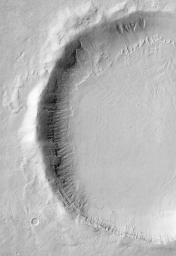
|
Gullies on Martian Crater (THEMIS)
- Click the image above for a larger view
- Full-Res JPEG (824 x 1199) (153.1 kB)
- Full-Res TIFF (824 x 1199) (989.3 kB)
Caption:
This visible-light image, taken by the thermal emission imaging system on NASA's 2001 Mars Odyssey spacecraft, indicates that gullies on martian crater walls may be carved by liquid water melting from remnant snow packs. The gullies in the top right-center appear to emerge from beneath and within a gradually disappearing blanket of snow. The current snow pack in this crater (located at 43 degrees south, 214 degrees east) appears to remain only on the cold, pole facing crater wall (top). On the less-shaded, warmer sides of the crater (left), the snow cover has completely disappeared, leaving the gullies exposed. The image shows an area 14.8 kilometers (9.2 miles) by 21.6 kilometers (13.4 miles). North is toward the top, and illumination is from the left.
Background Info:
NASA's Jet Propulsion Laboratory manages the 2001 Mars Odyssey mission for NASA's Office of Space Science, Washington, D.C. The thermal emission imaging system was provided by Arizona State University, Tempe. Lockheed Martin Astronautics, Denver, is the prime contractor for the project, and developed and built the orbiter. Mission operations are conducted jointly from Lockheed Martin and from JPL, a division of the California Institute of Technology in Pasadena.
Cataloging Keywords:
| Name | Value | Additional Values |
|---|---|---|
| Target | Mars | |
| System | ||
| Target Type | Planet | |
| Mission | 2001 Mars Odyssey | |
| Instrument Host | Mars Odyssey | |
| Host Type | Orbiter | |
| Instrument | Thermal Emission Imaging System (THEMIS) | |
| Detector | ||
| Extra Keywords | Crater, Grayscale, Thermal, Water | |
| Acquisition Date | ||
| Release Date | 2003-02-19 | |
| Date in Caption | ||
| Image Credit | NASA/JPL/Arizona State University | |
| Source | photojournal.jpl.nasa.gov/catalog/PIA04408 | |
| Identifier | PIA04408 | |
